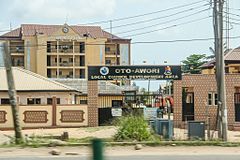
Oduduwa was a Yoruba divine king, legendary founder of the Ife Empire and a creator deity (orisha) in the Yoruba religion. According to tradition, he was the holder of the title of the Olofin of Ile-Ife, the Yoruba holy city. He ruled briefly in Ife, and also served as the progenitor of a number of independent royal dynasties in Yorubaland.
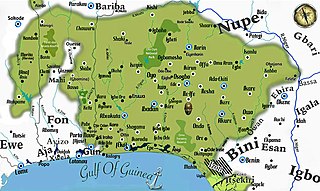
Yorubaland is the homeland and cultural region of the Yoruba people in West Africa. It spans the modern-day countries of Nigeria, Togo and Benin, and covers a total land area of 142,114 km2 (54,871 sq mi). Of this land area, 106,016 km2 (74.6%) lies within Nigeria, 18.9% in Benin, and the remaining 6.5% is in Togo. Prior to European colonization, a portion of this area was known as Yoruba country. The geo-cultural space contains an estimated 55 million people, the majority of this population being ethnic Yoruba.
Ota is a town in Ogun State, Nigeria with an estimated 163,783 residents. Ota is the capital of the Ado–Odo/Ota Local Government Area. The traditional leader of Ota is the Olota of Ota, Oba Adeyemi AbdulKabir Obalanlege. Historically, Ota is the capital of the Awori Yoruba tribe.
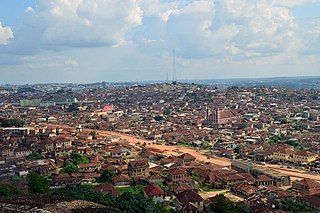
Ogun State is a state in southwestern Nigeria. Created on 3 February 1976 from the former Western State. Ogun State borders the Republic of Benin to the west for about 185 km, Oyo State and Osun State to the north, Ondo State to the east, Lagos State to the south for about 283 km, and has 16 km of coastline on the Bight of Benin to the south, interrupted by Araromi Beach exclave of Ondo State.

Ilaro is a town in Ogun State, Nigeria. Ilaro town houses about 57,850 people. Ilaro is the headquarters of the Yewa South Local government, now known as YEWALAND which replaced the Egbado division of the former Western State, and later became a part of Ogun State of Nigeria. Ilaro town is about 50 km from Abeokuta, the Ogun State capital, and about 100 km from Ikeja, the capital city of Lagos State.
The Ẹgbado, now Yewa, are a subgroup of the Yoruba people and inhabit the eastern area of Ogun West Senatorial District, Ogun State, in south-west Nigeria, Africa. In 1995 they changed their name to the Yewa which comes from the Yewa River which in turn comes from the Yoruba goddess Yewa. Yewa occupy four Local Government Areas, Yewa South, Yewa North, Imeko-Afon, and Ipokia, while the Ado-Odo/Ota LGA forms the fifth Awori part of the senatorial district.
The Ado-Odo/Ota Local Government Area is one of the 19 Local Government Areas of Ogun State, Nigeria. It came into existence on 19 May 1989, following the merging of Ota, part of the defunct Ifo/Ota Local Government with Ado-Odo/Igbesa Areas of the Yewa South Local Government. Ado-Odo/Ota borders on metropolitan Lagos. The Local Government Area is the second largest in Ogun State and it is headquartered at Ota at6°41′00″N3°41′00″E to the north of the Area. Other towns and cities include Araromi-Alade, Ado-Odo, Agbara, Igbesa, Iju-Ota, Itele, Kooko Ebiye Town, Owode, and Sango Ota. official website https://adoodootalg.org.ng/
The Olota of Ota is the traditional ruler and sovereign of Ota, Ogun State, Nigeria.

Abeokuta is the capital city of Ogun State in southwest Nigeria. It is situated on the east bank of the Ogun River, near a group of rocky outcrops in a wooded savanna; 77 kilometres (48 mi) north of Lagos by railway, or 130 kilometres (81 mi) by water. As of 2006, Abeokuta and the surrounding area had a population of 449,088.
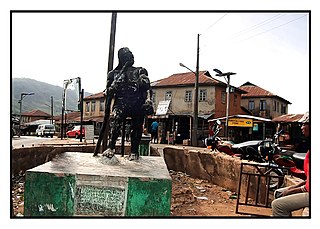
Okemesi-Ekiti is the local Government Headquarters of Okemesi/Idoile Local Government of Ekiti State, Nigeria, whose headquarters is the Ekiti town of Okemesi. Its population according to 2006 population census is 56,000 residents.
Ifo is a Local Government Area in Ogun State, Nigeria. Its headquarters are in the town of Ifo at 6°49′00″N3°12′00″E.It has an area of 521 km2 (201 sq mi) and a population of 698,837 at the 2006 census "Adebami-Tella". The postal code of the area is 112.

Iwajowa is a Local Government Area in Oyo State, Nigeria. Its headquarter is in the town of Iwere Ile. Iwere-ile had been a powerful war town in the old Oyo empire, dreadful for many Oyo indigenes, as well as the Alaafin to attack. Iwere-ile became the headquarters of Iwajowa LG on 4 December 1996 upon the creation of the new local government under the Gen Sanni Abacha's regime. Other town and settlements include Iganna, Ilaji-Ile, Idiko-Ile, Ayetoro Ile, Itasa, Idiko Ago, Elekookan, Ijio, Ayegun Wasimi and over 350 villages and farm settlements. The inhabitants of the area are predominantly Yoruba cohabiting peacefully with other tribes such as Fulani, Hausa, Tiv, Egede and others who engage in cattle rearing, large scale farming and hunting. This explains why food and cash crops are readily available at considerably cheap rates.

Ado-Odo is the metropolitan headquarters of the kingdom of Ado, renowned for its Oduduwa/Obatala temple, the ancient fortress of the traditional practice of Ifá. Oodu'a is also regarded by traditionalists as the mother of all deities worldwide. All of these made Ado an inviolate territory in western Yorubaland—the same "father-figure" status accorded to Ile-Ife. Unlike the other kingdoms, which had at one time or the other engaged in the internecine wars that ravaged Yorubaland in the nineteenth century, Ado stood out as an unconquered sanctuary city-state throughout the period.
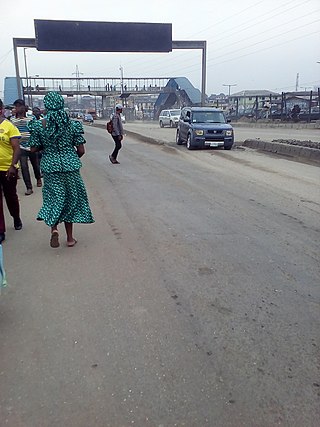
Ikosi a major town in Kosofe Local Government Area of Lagos State.
Ipetu-Ijesa, also called Ipetu-Aro Odo among its inhabitants, is a town in Oriade local government area, Osun State, Nigeria. It is located in the western part of Nigeria, about 40 km from Ile-Ife and 37 km from Akure. The people are of the Yoruba ethnic group, and the title of the traditional king of Ipetu-Ijesa is Ajalaye of Ipetu-Ijesa.

Badagry, also spelled Badagri, is a coastal town and Local Government Area (LGA) in Lagos State, Nigeria. It is quite close to the city of Lagos, and located on the north bank of Porto Novo Creek, an inland waterway that connects Lagos to the Beninese capital of Porto-Novo. The same route connects Lagos, Ilaro, and Porto-Novo, and shares a border with the Republic of Benin. As of the preliminary 2006 census results, the municipality had a population of 241,093.
Pahayi is a town in Yewa South local government area, Ogun State, Nigeria. It is located near Ilaro, not far from the border with Benin. Pahayi was one of the towns which was historically incorporated into the Egbado Protectorate under the Dahomians. It contains an elementary school and is linked by road to neighboring towns. The Orita Pahayi Modern Shopping Centre was completed in the 1990s. The inhabitants, mainly Yoruba people, are noted for their Wooro music, a type of music which is a "combination of all other music associated with Gelede, Ogun and Sango Festival." Apostle 'Bisi Emmanuel Ekunola emerged new monarch of Pahayi-Yewa November 16, 2021
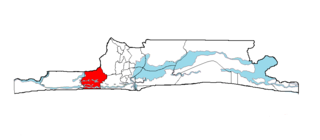
Ojo is a town and local government area in Lagos State, Nigeria, with a few notable locations such as Lagos State University and the Alaba International Market as well as others. Ojo is located on the eastern section of the Trans–West African Coastal Highway, about 37 km west of Lagos. It is a part of the Lagos Metropolitan Area.
The Territories of the Awori are a part of Nigeria inhabited by the Awori tribe sub-ethnic group of the Yoruba people, speaking a distinct dialect of the Yoruba language. Traditionally, Awori are found in two Nigerian States: Ogun and Lagos.
The Olofin Adimula Oodua of Ado-Odo is the Traditional Ruler and Yoruba king of Ado-Odo; he is also referred to as the Oba of Ado. Ado-Odo is the metropolitan headquarters of the Ado Kingdom in Ogun State, Southwestern Nigeria.
